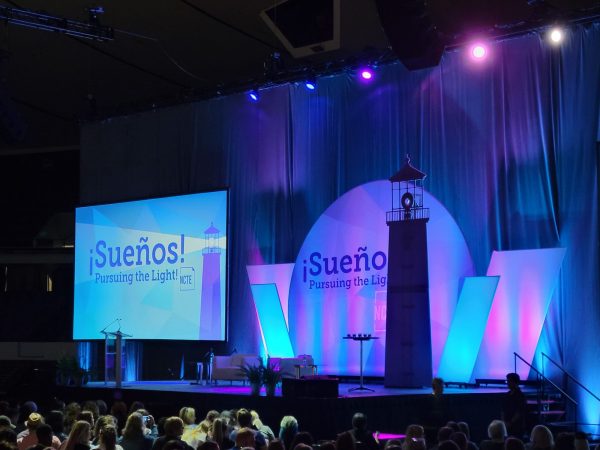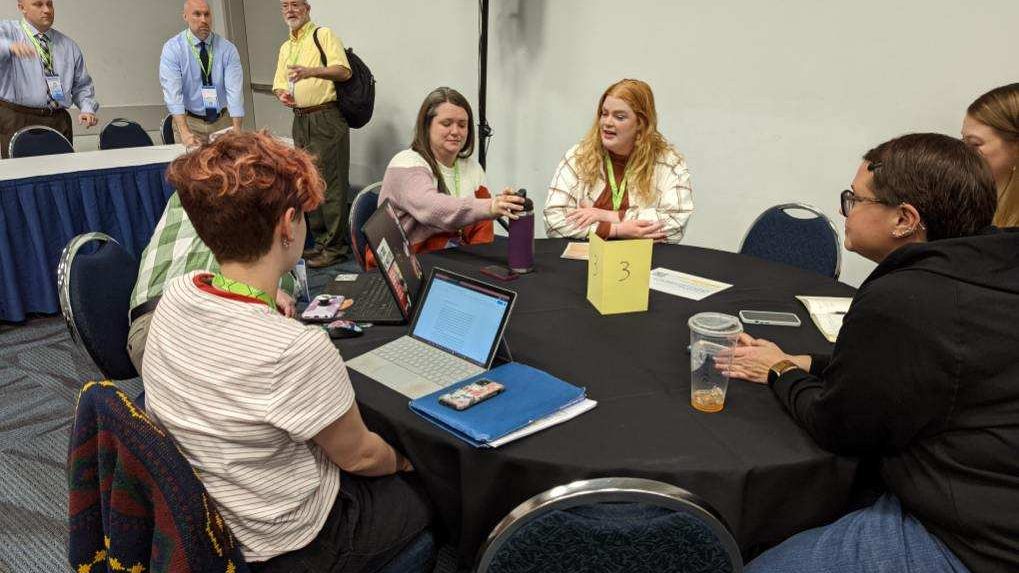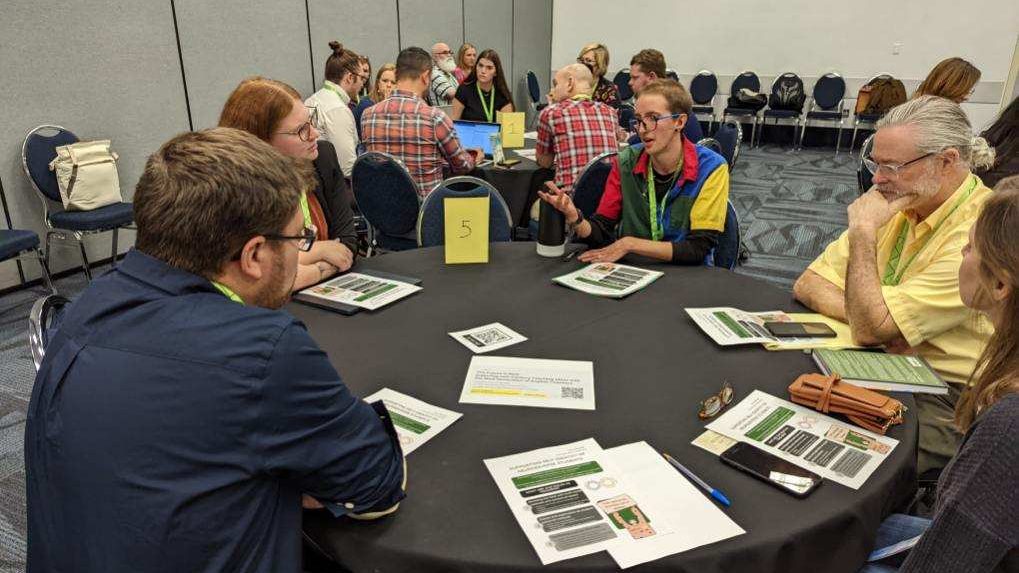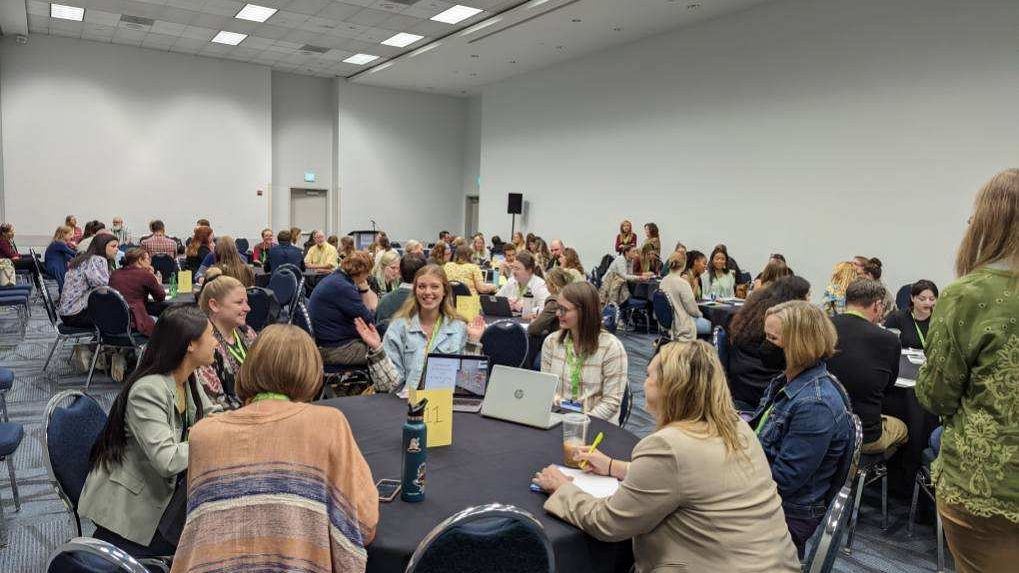
Graduate students share research with their peers
As Danielle Parker described what it was like to attend the 2022 National Council of Teachers of English (NCTE) Convention in Anaheim, California, one word continued to rise above the rest.
“The entire experience was so rejuvenating for me,” she said. “It was a packed day. Every day. But it was so amazing to just sit and absorb. I came back feeling very thankful that I got to start sharing my research and I had the opportunity to share it in a space that felt so supportive.”
An enriching, three-day conference, NCTE offers access to nearly 700 sessions led by literacy educators, for literacy educators each year. Centered around the theme, !Suenos! Pursuing the Light, this year marked the first time since 2019 that the event was held in-person. While Parker, a second-year graduate student in the M.A. English education program at CSU, had attended NCTE virtually in 2020 and 2021, she was eager to form connections and build community with her peers face-to-face.
While presenting her research, “Queer Belonging in Education: A Conversation on Queerness in Teacher Preparation Programs,” at The Future is Now: Exploring 21st Century Teaching Ideas with the Next Generation of English Teachers session, Parker discussed how current gaps in college teacher preparation programs are impacting queer–identifying educators.
Pointing to a lack of visibility and representation in teacher preparation curriculum and limited support and resources for the queer community, Parker argued that these forms of erasure are ultimately fostering a sense of not belonging in the classroom among queer-identifying teachers. From there, she outlined how teacher preparation programs could combat this problem by creating queer-specific spaces and cultivating safe partnerships and mentorships.
The response she received was anything but exclusionary.
“Oh my gosh. At NCTE, I was able to connect with so many other queer-identifying educators who are doing a lot of the same work as me. It was really inspiring,” she said. “I’m excited to follow up with folks who are doing really cool things and keeping those lines of communication open.”
In addition to the networking and professional development opportunities that NCTE offered, Parker emphasized that one of her favorite parts of the convention was connecting with her own CSU colleague: first-year English Ed. graduate student Zero Marshall.
“It was Zero’s first time at NCTE too, so we went to a lot of sessions together. It was really cool to come back and talk with him about all the new practices and research we’d encountered, and having that time to catch up and debrief,” Parker said.
Marshall also presented during The Future Is Now panel on his research about supporting self-identity of neurodiverse students in the classroom.
In his research, Marshall discusses how educators can facilitate effective and productive self-identity of neurodiverse students by creating multi-modal content and processes, centering student experiences to explore genres, and incorporating nonverbal communication techniques while teaching.
“I’m really interested in how we can build communities that support our diverse students,” Marshall said. “Like, how can we implement effective pedagogies that support diverse students and make our classrooms more accessible?”
While taking E507: Current Professional Concerns in TESOL/Applied Linguistics: Decolonization and Related Topics with Dr. Fabiola Ehlers-Zavala during the fall semester, Marshall became inspired to consider how the language of decolonization could play a role in his own research.
“We worked through a lot of really interesting things in that class, and one thing that stuck with me is this idea of community—and how the role of the teacher could be more like a facilitator of communication than as a hierarchical leader with centralized power in the classroom,” he said.
Ultimately, Marshall believes neurodiverse students will benefit greatly from a holistic approach in which a community-centered atmosphere comes first. “By focusing more on relationships and interactions between students, we can help interrupt the invisible toll of ableism.”
Fueling the future of our next teachers

For graduate students thinking about attending NCTE, Marshall and Parker both agreed: It’s beyond worth it. Not only for the experience to share research and receive insightful feedback, but also for the jolt of motivation it can provide in the middle of a hectic semester.
“When we all hit weeks 10 through 12, we need a little bit of inspiration to get through,” Parker said. “So, taking that moment to say like I just want to be inspired and be around others was really restorative for me. NCTE has definitely shifted the trajectory of my work and the way that I’m showing up for the rest of the semester.”
Parker noted that Assistant Professor Naitnaphit Limlamai gave her excellent advice that really made a difference in her conference experience:
“Naitnaphit said any time before going to a conference, sit down with yourself and take time to ask: What do you need from this conference? And then plan accordingly. So, ask yourself: Do you want to learn something new? Do you want to try and learn more about a certain perspective? Then go to those sessions. Do you need community? If you really consider what you hope to gain first, then that conference will be really fulfilling for you.
Marshall added that, in a way, going to NCTE is a lot like a choose-your-own-adventure story.
“It’s great because you can kind of pick a topic that you want to focus on and build your conference experience around that theme. Like, I was able to attend several panels that focused on indigenous education, and indigenizing practices and indigenous representations in literature,” he said.
One such panel that struck Marshall and Parker was led by Associate Professor of English Education at CSU, Dr. Ricki Ginsberg.
Constellations and Not a Single Star: Shining and Rising Native Voices on Collaboration and Writing Truths included a conversation facilitated by Ginsberg with five Native authors discussing how collaboration and a writer’s craft pertain to writing truths, history and historicity, and the writing journey.
Another panel that Marshall particularly enjoyed included CSU’s own Assistant Professor Rosa Nam. In Dragon Ladies, Model Minorities, and Quiet Girls, Dr. Nam facilitated a conversation with Dr. Jung Kim of Lewis University on Asian American girlhood representation and resistance in literature. The panel featured five Asian American children’s, middle grade, and young adult women authors: Sayantani DasGupta, Debbi Michiko Florence, I.W. Gregorio, Misa Sugiura, and Andrea Wang.
Though Parker and Marshall are on opposite ends of their graduate careers, both students felt excited about what the future looks like. For Marshall, there are endless avenues to explore when it comes to defining his thesis. Currently, he’s interested in engaging more with practices that center how to support culturally and linguistically diverse students.
With one semester to go until graduation, Parker is looking to her mentor, Dr. Ricki Ginsberg, as a role model for the kind of future she hopes to have as an educator.
“I’m definitely planning on getting into a secondary classroom. I would love to stay close to Fort Collins, but I’ve also started looking at other places in Northern Colorado…I would eventually like to come back and get my PhD. My dream would be Teachers College at Columbia,” she said. “I always tell Ricki that I want to be her when I grow up, so I would love to come back and be a teacher educator at some point.”


